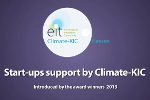Eurbanlab – Accelerating urban innovations
Challenge Platform: Making Transitions Happen
Project Start Date: 04/2011
Lead partner: ARCADIS
Project type: Innovation project – Develops and brings to market climate-relevant knowledge, products and services
Project lead: Anne-Marie Spierings, ARCADIS
Partners
This project involves 9 partners in 2 European countries:
- Netherlands Organisation for Applied Scientific Research (TNO), The Netherlands (Climate-KIC Core Partner)
- Institute for Sustainability, UK (Climate-KIC Core Partner)
- Advancity - L’Association pour le developpement du pôle de compétitivité, France
- Université de Versailles, France (Climate-KIC Core Partner)
- University of Utrecht, The Netherlands (Climate-KIC Core Partner)
- Instituto Valenciano de la edificación, Spain
- GDF Suez, France (Climate-KIC Core Partner)
- Fondaterra, France
- L’École des Ingénieurs de la Ville de Paris (EIVP), France
- Twynstra Gudde, The Netherlands
Concept
Today, over half of the world’s population lives in cities. Given the effects of climate change and other environmental challenges for cities, the need for change is high. Eurbanlab has developed a framework to guide cities to sustainability through systemic urban innovations. The challenge is to accelerate innovation cycles in cities and overcome a general reluctance to invest in innovative and systemic projects. Eurbanlab proves through its assessments which innovations are ready to be widely implemented and understands what process to use to accelerate the achievement of increasingly sustainable results.
The climate change issue
It is estimated that cities account for at least 70% of global carbon emissions. Buildings and transport are the largest contributors of emissions, causing as much as 40% and 30% respectively. Existing buildings tend to be inefficient in the energy usage. Knocking these buildings down to make way for new ones is expensive and means losing certain cultural and social value. Retrofitting of complete building stocks and an implementation of energy efficiency measures in new buildings is necessary. Similarly, transport and mobility systems in cities need to be (re)designed, in that innovative efficiency solutions are integrated. Hence, in order to overcome the impacts of climate change there is a need for a systemic approach to urban innovation which encompasses all urban sustainability dimensions.
The Project Solution
Eurbanlab has developed a model for harvesting, analysing and assessing information on urban innovations, with a special emphasis on the energy efficiency of complete neighbourhoods. The project has 19 partners (with 10 most essential ones being listed in the box on the previous page) and is extending this network of essential stakeholders to highlight all the necessary accompanying measures when implementing urban innovations in specific contexts. Here, the success of past projects can be shared and the benefits of investing in new innovative urban projects are clear. The Eurbanlab library will be used to record the commercial dynamics of 250 innovation projects in terms of energy efficiency performance gains relating to whole life cost.
Eurbanlab performs assessments of potential innovations. A systematic and scientific evaluation of any sustainable urban innovation is carried out. Performance is assessed in terms of ‘profit, people and planet’ dimensions, and an in-depth analysis will indicate the importance of the process in achieving the results and the capacity to scale up the innovation and apply it to other contexts.
In doing so, Eurbanlab provides a service for rating the investment risk of urban projects and for advising European stakeholders (such as cities, developers, utilities, services providers, integrators, engineering companies, urban planning agencies, architects, contractors) which innovations to adopt and implement. Eurbanlab further supports innovative manufacturers and contractors, either large or SME, through rating their innovations and advising them as to all possibilities for improvements or for adapting their products to new customers and contexts. Eurbanlab also works to support, create and spread their knowledge among all stakeholders.
Although Eurbanlab is a European organisation, the service it provides is globally applicable as it is designed to explore how adaptations can be implemented in new contexts.
The role of Climate-KIC
Climate-KIC assisted the project by providing access to their extensive network of partners. This enabled Eurbanlab to collaborate with other organisations investigating the same subject, leading to an exchange of ideas across a whole range of countries, taking diverse cultures and attitudes into account.



